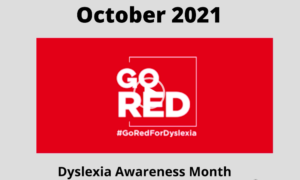It’s October, that means it’s Dyslexia Awareness Month and in the UK the British Dyslexia Association helps to raise understanding with Dyslexia Awareness Week, 4-10 October 2021. This year, they ask us to consider dyslexia as being ‘invisible’. Our friends at Succeed With Dyslexia are also asking us to #GoRedForDyslexia.

The BDA state,
We know that dyslexia comes with many challenges, but many people in our community feel like their struggles are unseen. Because dyslexia itself isn’t visible, individuals with dyslexia often feel unsupported, unwanted, invisible. From the child at school struggling to keep up with the rest of their friends, to the office worker feeling like they don’t belong.
Last year, Georgina, the owner of CodeBreakers, took part in Channel 4’s, The Write Offs to help demonstrate how many individuals with dyslexia struggle on a daily basis. For those with poor literacy skills this can impact them at work, social settings and day-to-day tasks we all take for granted. As individuals who don’t have a reading or spelling difficulty, we probably don’t appreciate the huge amount of communication we process, which requires literacy skills.
Imagine standing in the queue at the chemist, waiting to fill out your details to collect your prescription, wandering the aisles of the supermarket wondering where your usual products have now been moved to, what if they’ve changed the label so you can no longer recognise your item by the images? Imagine you need to return your online purchase to the supplier, where do you find the information, how do you send it back? The council offices are closed due to Covid and the lovely lady that helped you out, is now only available via an online chat or you need to fill in the form on the website to get a refund. Your hospital appointment is now online, just how do you read the letter and log onto the computer for a virtual meeting? That’s without the texts and emails which bombard us on a daily basis from friends or that latest bargain website you just signed up to. Quite frankly, it’s exhausting for most of us who don’t struggle.
Our friends at Succeed With Dyslexia report;
Research by The Literacy Trust reveals that 1 in 6 people in England – that’s 7.1 million people, or 16.4% of the entire English population- have what they describe as ‘very poor’ literacy skills. This means that whilst they can understand straightforward texts on familiar topics accurately and independently, they could struggle when reading information from unfamiliar sources or topics, or information that’s presented in a dense or unusual way.
The impact upon those struggling goes wider that reading and spelling difficulties, for some, it can impact upon self esteem or go further and impact long term on mental health. During Covid, we have had less face to face opportunities to communicate and more and more online or written information to process. Some have experienced isolation and not been able to access their usual support network, who perhaps read out that letter from the hospital or called the council to explain the wheelie bin hadn’t been collected last week. The impact of Covid may have resulted in some job roles changing, individuals may now be required to work remotely or online, they may be facing the challenges of new technology or less support from colleagues. It’s likely that this isolation felt during Covid has impacted those with dyslexia to a greater degree and result in increased mental health difficulties.
For those who are not involved in education or supporting individuals with literacy difficulties, they may not be aware of dyslexia and how it impacts individuals. The Write Offs, which aired September 2020, Channel 4, helped to highlight the experiences of many adults. The nation was surprised by the fact that adults today could still be experiencing this level of difficulty. It’s likely that employers who don’t have the wealth of knowledge from a corporate human resource management team aren’t aware of dyslexia and how it impacts on literacy and the wider areas too. We need to utilise this opportunity to raise that awareness. We also need to demonstrate the positives too, how those with dyslexia are also an asset to an employer. The BDA have lots of information for employers.
Georgina from CodeBreakers worked closely with Tommy Dawkins, on The Write Offs, helped to build his confidence around literacy. At the end of their sessions together, he wrote this heartfelt poem, listen to all of his poem, written and read by Tommy Dawkins below.
“The jobs we’ve lost; the promotions we’ve missed
Because we cannot read and write
Shopping, children’s names, letters and poems–
Things you take for granted, we have a problem with
Because we cannot read and write.”

